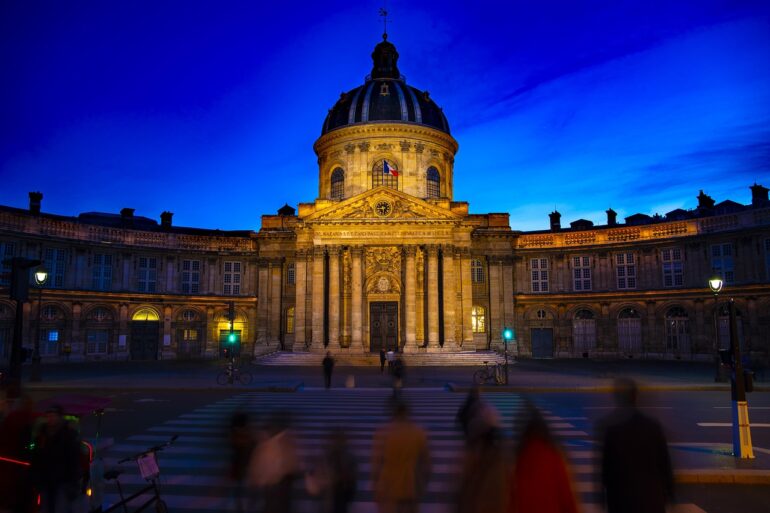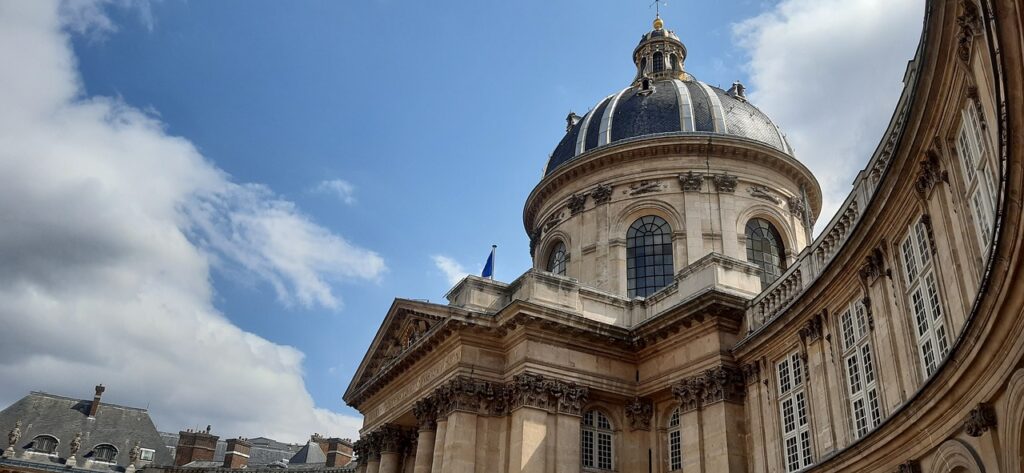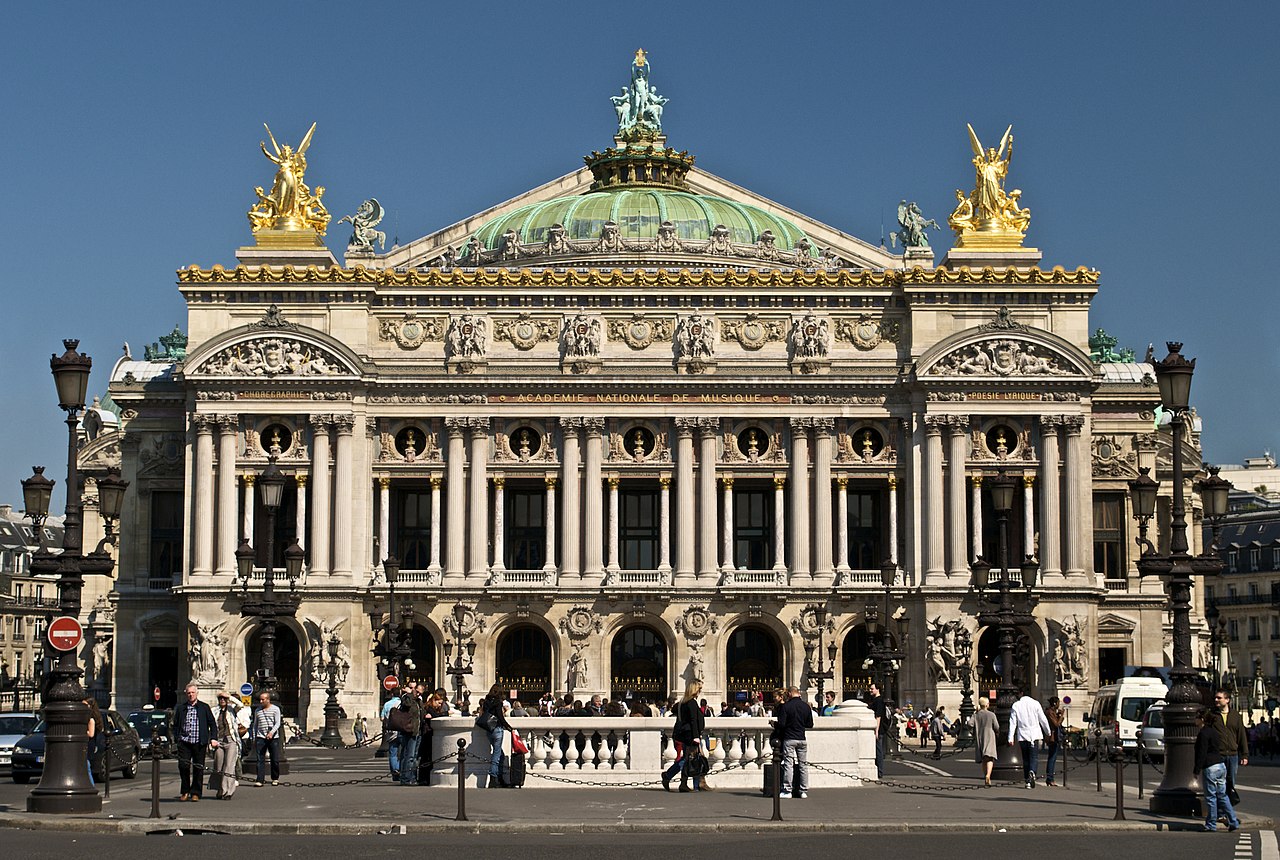What is the Institut de France?
The Institut de France is a prestigious institution that embodies France’s intellectual and cultural excellence. Founded in 1795, it brings together the nation’s greatest academies, each dedicated to a specific field of knowledge. Its core mission is to promote the sciences, literature, and the arts, thereby contributing to the enrichment of France’s cultural heritage. Composed of five academies, the Institut plays a crucial role in preserving and advancing knowledge.
The Institut de France stands out for its ability to bring together experts and scholars from diverse backgrounds under one roof. This union encourages interdisciplinary dialogue and inspires innovative solutions to contemporary challenges. As such, the Institut is often seen as a privileged meeting place for creative minds and forward-thinking intellectuals, offering a unique platform where ideas can be exchanged and developed.
By joining the Institut de France, one becomes part of a centuries-old tradition of academic excellence. It offers the opportunity to actively contribute to the dissemination of knowledge and to enrich the nation’s cultural legacy. The Institut invites us to explore the frontiers of knowledge and push the boundaries of human understanding.
History of the Institut de France Through the Centuries
The history of the Institut de France is closely tied to the political and cultural transformations that have shaped France. Established in the aftermath of the French Revolution, it was conceived as a way to centralize knowledge and redefine the academic standards of a nation in transition. Initially composed of three academies, it gradually expanded to include five distinct academies.
Over the centuries, the Institut has adapted to social and technological evolutions. It has played a key role in the rise of new disciplines and the promotion of innovative research. It also contributed to the modernization of higher education in France, helping to design rigorous and diverse academic programs.
Today, the Institut de France is internationally recognized for its commitment to academic excellence and its ability to inspire future generations of researchers and creators. It continues to stand as a cornerstone of French culture, preserving and enhancing a priceless intellectual heritage for humanity.
The Five Academies of the Institut de France
The Institut de France is composed of five academies, each with a specific mission and a unique contribution to the intellectual and cultural landscape:
-
Académie française (French Academy): Founded in 1635, it safeguards the French language and promotes literature. It is best known for its work on the official French dictionary.
-
Académie des inscriptions et belles-lettres (Academy of Humanities): Established in 1663, it focuses on ancient civilizations and classical languages, enriching our understanding of human history.
-
Académie des sciences (Academy of Sciences): Created in 1666, it fosters scientific and technological progress, playing a key role in advancing research in France.
-
Académie des beaux-arts (Academy of Fine Arts): Founded in 1816, it promotes artistic creation in all forms, from painting to architecture, music, and cinema.
-
Académie des sciences morales et politiques (Academy of Moral and Political Sciences): Established in 1795, it addresses ethical, political, and social issues, enriching debates on the great questions of our time.
Together, these academies bring together world-renowned experts, providing a powerful network that supports research and creation across diverse fields, reinforcing France’s cultural and intellectual influence.
The Architectural Treasures of the Institut de France
The headquarters of the Institut de France is an architectural masterpiece that reflects the grandeur and elegance of French design. Located in Paris’s 6th arrondissement, the Palais de l’Institut, also known as the Collège des Quatre Nations, is a remarkable example of 17th-century classical architecture. Designed by architect Louis Le Vau, the building embodies the prestige of the Institut.
Its majestic dome, rising proudly above the banks of the Seine, is one of its most recognizable features. The ornamental details and craftsmanship of the era are visible throughout, testifying to the meticulous attention devoted to its construction.
Visitors to the Institut can admire not only the exterior but also its magnificent interiors. Meeting rooms, libraries, and galleries house exceptional artworks and rare treasures that reflect the richness of French cultural heritage.
The Precious Collections of the Institut de France
The collections housed within the Institut de France are a true national treasure, containing invaluable works and documents. Distributed among the different academies, they cover a wide range of disciplines, from literature to science, the arts, and the humanities.
Among the most remarkable are the archives of the Académie française, which hold rare manuscripts and the correspondence of celebrated writers—offering precious insights into the evolution of the French language and the literary debates that shaped French culture. The collections of the Académie des beaux-arts include masterpieces by renowned artists, from paintings and sculptures to sketches and models.
The Institut’s libraries are treasures in themselves, preserving ancient and modern books, journals, and digital archives. These resources are invaluable for researchers and students alike, ensuring that knowledge is passed down to future generations.
The Institut de France and Its Role in French Culture
The Institut de France plays an essential role in promoting and disseminating French culture, both nationally and internationally. Through its commitment to academic and artistic excellence, it reinforces the influence of French heritage worldwide.
By hosting conferences, symposia, and exhibitions, the Institut provides a forum for dialogue on cultural, scientific, and artistic issues. These events bring together experts, researchers, and culture enthusiasts from across the globe, fostering intercultural exchange.
As a guardian of French culture and knowledge, the Institut embodies values of openness, diversity, and creativity. Thanks to its initiatives, it continues to ensure that French intellectual and artistic traditions thrive and evolve.
Events and Activities at the Institut de France
The Institut de France is a vibrant hub of cultural and intellectual life, offering a wide variety of events throughout the year. These include lectures, colloquia, exhibitions, and award ceremonies that attract a diverse audience ranging from experts to passionate amateurs.
The academies regularly organize seminars and conferences on topics spanning scientific advancements, philosophical debates, art history, and contemporary literature. Temporary exhibitions showcase artworks and historical documents from its collections, often accompanied by guided tours and lectures.
These activities provide unique opportunities to discover new perspectives, broaden knowledge, and engage with the richness of French cultural heritage.
Visiting the Institut de France
Visiting the Institut de France offers a unique immersion into French history and culture. The Palais de l’Institut is open to the public on special occasions such as the European Heritage Days, giving visitors the chance to explore its architectural and artistic treasures.
The official website announces the dates of public events and guided tours, which provide access to the meeting rooms, libraries, and galleries. Expert guides share valuable anecdotes and insights into the history and collections of the Institut.
In addition, the Institut regularly hosts public lectures and temporary exhibitions, often free and open to all. These visits allow anyone to connect with the heritage and intellectual life of France.
Key Figures Associated with the Institut de France
Over the centuries, many eminent personalities have been associated with the Institut de France, contributing to its prestige. These include writers, scientists, artists, and philosophers whose legacies continue to inspire.
Among the great names of the Académie française are Victor Hugo, Voltaire, and Marguerite Yourcenar, whose works profoundly shaped French literature. In the sciences, figures such as Louis Pasteur and Marie Curie left an indelible mark through groundbreaking discoveries that transformed our understanding of the world.
These figures embody the values of intellectual rigor and creativity that the Institut continues to uphold.
Conclusion: The Institut de France, A Heritage to Preserve
In conclusion, the Institut de France is much more than an academic institution. It represents a priceless cultural and intellectual heritage that must be preserved and celebrated. Through its dedication to excellence and diversity, the Institut plays a central role in promoting French culture and enriching collective knowledge.
By supporting and engaging with its activities—whether through visits, events, or research—we contribute to continuing a centuries-old tradition of intellectual and artistic brilliance. The Institut de France is a symbol of our commitment to knowledge and creativity, a treasure to safeguard for generations to come.






